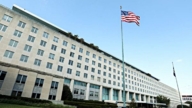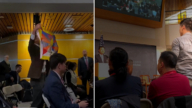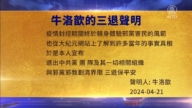【新唐人2014年11月05日讯】中共最高检察院官员日前透露,中共中央已正式批准成立新的“反贪总局”,以便直接“查办大案要案”。分析指出,成立任何机构或部门,都不能从根本上解决中共官员全面贪腐的问题。
11月2号,中共第十八届中央纪委常委、最高检察院副检察长邱学强,在接受《新华网》的采访时透露,中央已批准成立新的“反贪总局”,局长由一名副部级检察委员会专职委员兼任,这个机构将取代目前的“最高检察院反贪污贿赂总局”。不过,邱学强没有说明新反贪总局成立的具体时间,以及领导成员组成等细节。
邱学强表示,最高检反贪总局自1995年成立以来,经过近20年的发展,一些影响办案成效的问题逐渐暴露出来,已经不能完全适应反腐新形势的需要。当前职务犯罪系统化、区域化、家族化、群体化。在今年最高检直接组织查办的中共发改委系列案件中,有11名局级官员被查处,其中价格司原领导班子大多数涉案,出现“塌方式”腐败。
因此,邱学强说,中共成立新的反贪总局,要“集中精力查办大案要案。”
北京时政观察人士查建国:“很多贪官形成了党的领导的一个包袱,很不得人心,为了收回人心,为了甩掉这些包袱,习近平中央肯定是要反贪的,成立新的反贪的专门机构,对于反贪可能会加大一些力度吧。但是,它还是人治,不是法治。所以成立这个机构,对于一些很敏感的大的问题,它不会起什么作用。”
据了解,就在邱学强透露成立新的反贪总局前,10月31号,最高检反贪污贿赂总局局长徐进辉在新闻发布会上表示,今年直接查办了中央机关一批工作人员涉嫌贪污贿赂犯罪案件,其中包括国家发改委系列案件和央视系列案件。徐进辉并透露,从发改委煤炭司副司长魏鹏远的家中,一次性起获人民币2亿余元赃款。
中共中纪委书记王岐山11月3号在党媒《人民日报》发表文章指出,反腐败是一场输不起的斗争,当前形势依然严峻。
南京律师、东南大学法学院教授张赞宁:“中共腐败的现状,肯定是不可能靠一个反贪总局来改变,近30年来,反贪是越反越多,贪污的问题是一个制度性的问题,腐败的土壤没有根除,贪污的问题就不可能得到根除,最好的方法就是建立一个民主制度,让人民群众来监督政府官员。”
独立评论员张健认为,成立任何机构或部门,都不能从根本上解决中共官场全面腐败的问题,要解决这些问题,最直接最有效的办法就是解体中共。
独立评论员张健:“中共建政之后残杀了这么多无辜,不单纯是它官员贪污受贿腐败这样一个非常轻微的问题,它最主要的问题是,整个对全人类犯下了无比严重的罪行,这些在未来必须进行清算的,所以中共无论是搞什么样的反腐,搞什么样的廉政建设,这都是一个很无耻的行为。”
此外,香港《明报》指出,中共十八大后落马的省部级以上高官,都由中纪委宣布调查,但是在最近展开的海外追查逃犯中,纪委面临与外国机构对接难的问题。
东南大学法学教授张赞宁认为,成立新反贪总局的另一个目的,是为了便于追查逃到海外的贪官。
张赞宁:“中纪委对外是一个不合法的组织,所以中纪委是不好对外的,它只是对内的,如果成立了反贪总局,它应当是国务院下属一个部门,在国际上就有一个对口的单位,这样对于追查逃到国外的那些贪官,就有一个合法的身份。”
之前有外国媒体指出,中共当局请求西方民主国家协助缉拿外逃的官员,但这项请求给这些国家带来巨大的挑战。因为中共中纪委的不透明性质和模糊的法律地位,使西方民主国家难以配合。
采访/朱智善 编辑/陈洁 后制/周天
China Forms New Anti-Corruption Bureau
China announced approval of a new anti-corruption bureau
under the administration of the Supreme People’s Procurate.
Analysts don’t believe any form of institution will root out
the wide spread graft issue under the Communist regime.
Deputy Procurator-General, Qiu Xueqiang, told Xinhua
News Agency on Nov. 2 the new anti-corruption bureau will be
in the charge of a procuratorial committee member
at the deputy ministry level.
It is to replace the current Supreme People’s Procurate
Anti-Corruption Bureau (SPACB).
Details about the time of set up and membership of the bureau
are yet to be disclosed.
Qiu Xueqiang said the current SPACB has a number of efficiency
issues after 20 years of operation since 1995.
It can no longer meet the needs of the latest anti-graft campaign
which deals with systematic, regional, family-oriented,
and group-oriented crimes.
This year, a series of cases involved the National Development
and Reform Commission (NDRC) and as many as 11 bureau-level
officials have been investigated.
In particular, the pricing division at NDRC has a number of
leaders involved in a network of corruption cases.
Qiu Xueqiang said the new anti-corruption bureau will
“concentrate on investigating major cases."
Beijing politics watcher Zha Jianguo: “The many corrupt officials
have become a burden for the Party leadership.
To regain the people’s trust, to drop these burdens,
Xi Jinping’s leadership must fight against the corruption.
A new anti-graft organ might exert some strength.
But, it’s still the rule of man, not the rule of law.
This new organ is unlikely to function much
in some major sensitive cases."
Earlier on Oct. 31, Xu Jinhui , an official from the Supreme
People’s Procurate confirmed in a press conference
that among a number of corruption crimes
are cases of the NDRC and CCTV.
In particular, more than 200 million yuan in local and foreign
currency was found during a single operation at the home
of Wei Pengyuan, deputy director of NDRC coal department.
Secretary of the Central Commission for Discipline Inspection
(CCDI) Wang Qishan, expressed in his People’s Daily article, Nov 3,
that anti-corruption is a struggle that can not be lost, and the
current situation is still grim.
Southeast University Law School Professor Zhang Channing:
“An anti-corruption bureau will not change the corruption
in the Chinese Communist Party (CCP).
For 30 years, the anti -corruption has ended up
with more corruption.
Corruption is an issue of institution.
As long as the soil stays, the corruption won’t be rooted out.
Democracy is the best system which allows people
to supervise the officials."
Independent commentator Zhang Jian believes that
the establishment of any agency or department,
will not fundamentally solve the problem of corruption.
These problems will only be dissolved with the disintegration
of the CCP, the most direct and effective way.
Independent commentator Zhang Jian: “Since the CCP
established its regime, many innocent people have been killed.
It is not just some minor issues such as bribery and corruption.
The main issue is its heinous crimes against the entire human race.
These will be liquidated.
Whatever the anti-corruption or clean governance
it is engaging in now is totally shameless."
Hong Kong’s Ming Pao news indicated that investigation
of high officials at the provincial and ministerial level
is handled by CCDI.
But, in cases of officials fleeing overseas, the CCDI is faced
with difficulty for the agency’s incompatibility
between domestic and foreign.
Professor Zhang Channing believes the purpose
of the new anti-corruption bureau is also to facilitate
investigation of officials who fled overseas.
Like Zhangning: “The CCDI is an illegal organization
to foreign countries. It can only operate internally.
The anti-corruption bureau will be under the State Council,
which has a counterpart unit in the international community.
It will have a legitimate identity to track down
those corrupt officials who fled abroad."
Earlier, there were foreign media reports that Beijing seeks
to enlist the help of western democratic governments
in pursuing officials who flee overseas.
But the opaque nature of the CCDI and its ambiguous legal
status make it very difficult for any western democracy
to co-operate.
Interview/Zhu Zhishan Edit/ChenJie Post-Production/ZhouTian




























